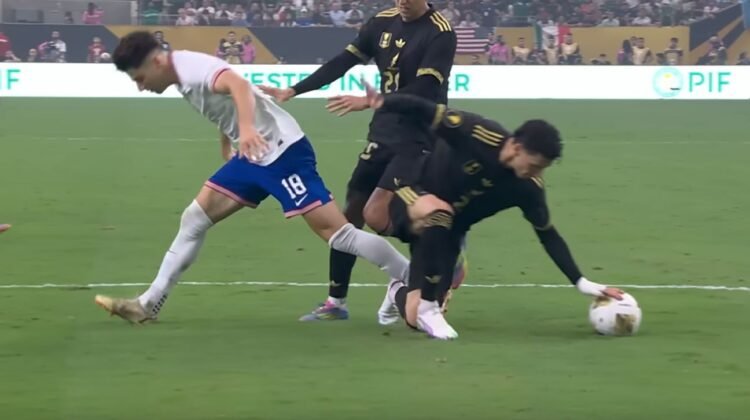
Gold Cup final VAR: USMNT robbed of handball penalty vs. Mexico
United States coach Mauricio Pochettino was fuming after his side lost 2-1 to Mexico in the Concacaf Gold Cup final on Sunday, adamant a penalty should have been given for handball.
It wasn’t the end of the VAR drama for his team, as Edson Álvarez‘s goal was initially ruled out for offside — only for the video assistant to step in and award his match-winning 77th-minute effort.
Pochettino’s gripe referred to an incident in the 66th minute when the score was locked at 1-1. Mexico defender Jorge Sánchez touched the ball with his hand inside his own area, but both the referee and the VAR ignored claims for a spot kick.
“The truth was that if that happened in the opposite half, in the other box, for sure it’s a penalty,” Pochettino complained. “The player was with a knee on the floor, he pushed the hand over the ball. It’s not that the hand was [already] on the floor, and the ball touched.
“For me, it was embarrassing to see that situation and it’s a shame. I understand that maybe 70,000 people [in the stands]you know, giving this penalty, it’s not easy.”
Did Pochettino have a point?
Possible penalty: Handball by Sánchez
What happened: Max Arfsten was in possession and moved into the box under pressure from Sánchez and Roberto Alvarado. Sánchez got his foot to the ball to take it off the wing-back, but his hand landed on top of it. Referee Mario Escobar made it clear he felt Sánchez had only touched the ball because of his supporting arm, and it was checked by the VAR, Benjamin Pineda.
Was Decision: No penalty.
Should this have been called a handball? 🤔 pic.twitter.com/nqlOWRI53F
— FOX Soccer (@FOXSoccer) July 7, 2025
VAR review: The handball law has become confusing in recent seasons, mainly because many of the exemptions against an offense are now hidden in guidance to officials rather than appearing in the text of the Laws of the Game.
One such factor a referee has to take into account is whether the hand or arm touches the ball when it’s going to the ground to support the body. So, a player doesn’t have to move his arm out of the way and crash to the floor: however, he must be able to stop his fall.
That hand or arm doesn’t already have to be in contact with the ground when it’s hit by the ball, as Pochettino suggested, because it’s natural that a player would extend an arm when falling to the ground. Indeed, the IFAB’s own illustration of the exemption doesn’t have the arm in contact with the grass.
However, that doesn’t give a defender carte blanche to touch the ball as they are falling; there has to be a consideration for the player deliberately making sure their arm stops the ball, or moving it toward the ball.
Sánchez would argue that there was such a short time between his collision with Arfsten and his hand touching the ball that there was nothing he could do. But he is always looking at the ball, and his arm appeared to extend into its path. It should have been a penalty on VAR review.
Judging just how deliberate the act is in these circumstances isn’t necessarily easy.
There are clear similarities to a handball by Arsenal’s Martin Ødegaard at Liverpool in December 2023. The midfielder was inside his own area and under pressure from Mohamed is wrongand his hand knocked the ball away. The referee’s on-field opinion was supported by the VAR because Ødegaard was trying to keep his balance and the handball was therefore deemed accidental — the refereeing body in the Premier League later admitted that a spot kick should have been awarded.
For Ødegaard see Sánchez, two decisions whereby the VAR is trying to read the intentions of the defending player and has chosen to stick with the on-field view, yet both should have been spot kicks.
We did see the VAR step in at the 2022 FIFA World Cup, though this was accepted as a mistaken intervention. Portugal were given a controversial late penalty against Uruguay when José María Giménez slid in to make a challenge and the ball came off his arm that was going to the ground as he was falling backward, stopping Bruno Fernandes‘ pass. The referee didn’t give the spot kick, but it was controversially given on VAR review despite there being serious doubt that there was any intent by Giménez to stop the ball, rather than purely support the body.
